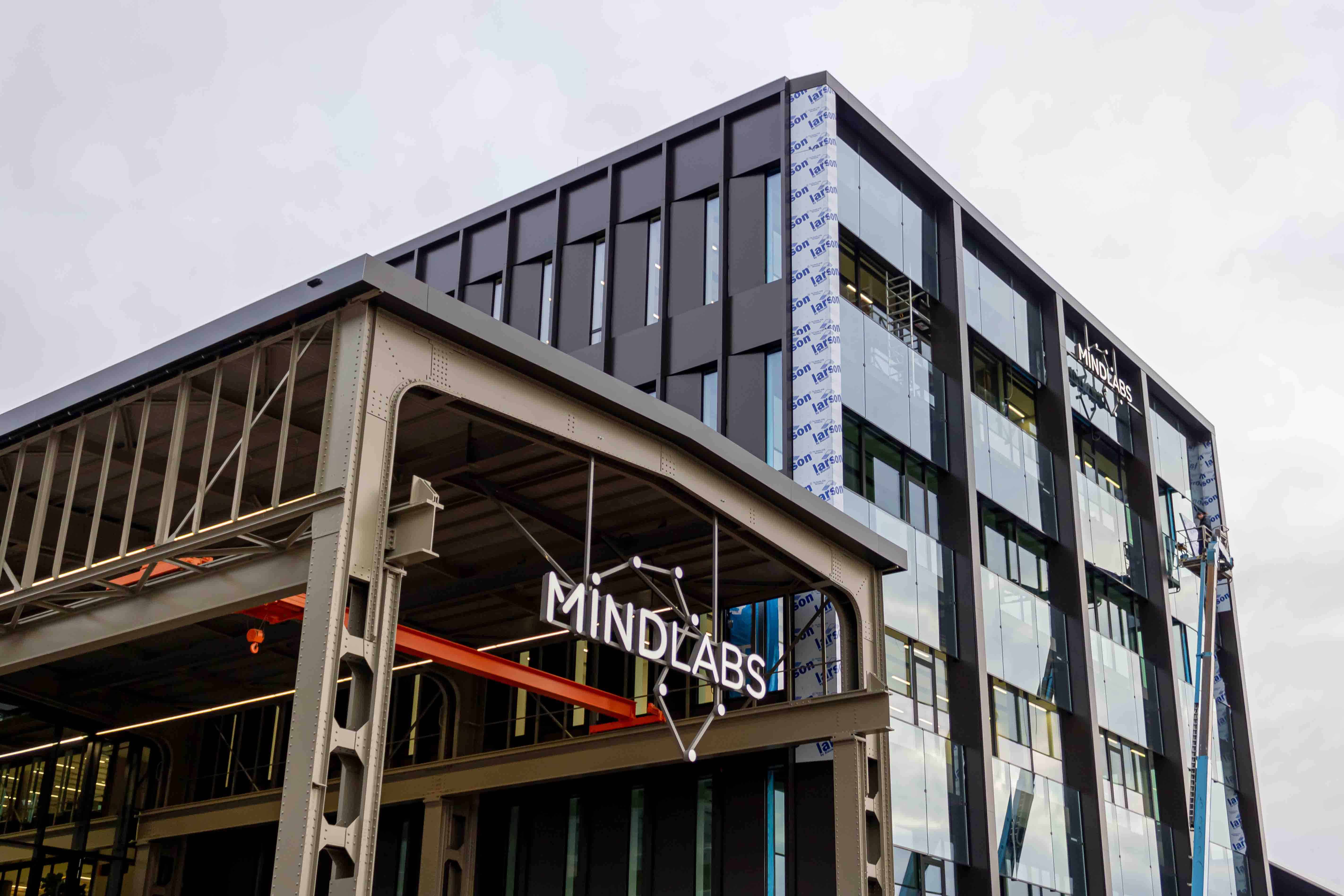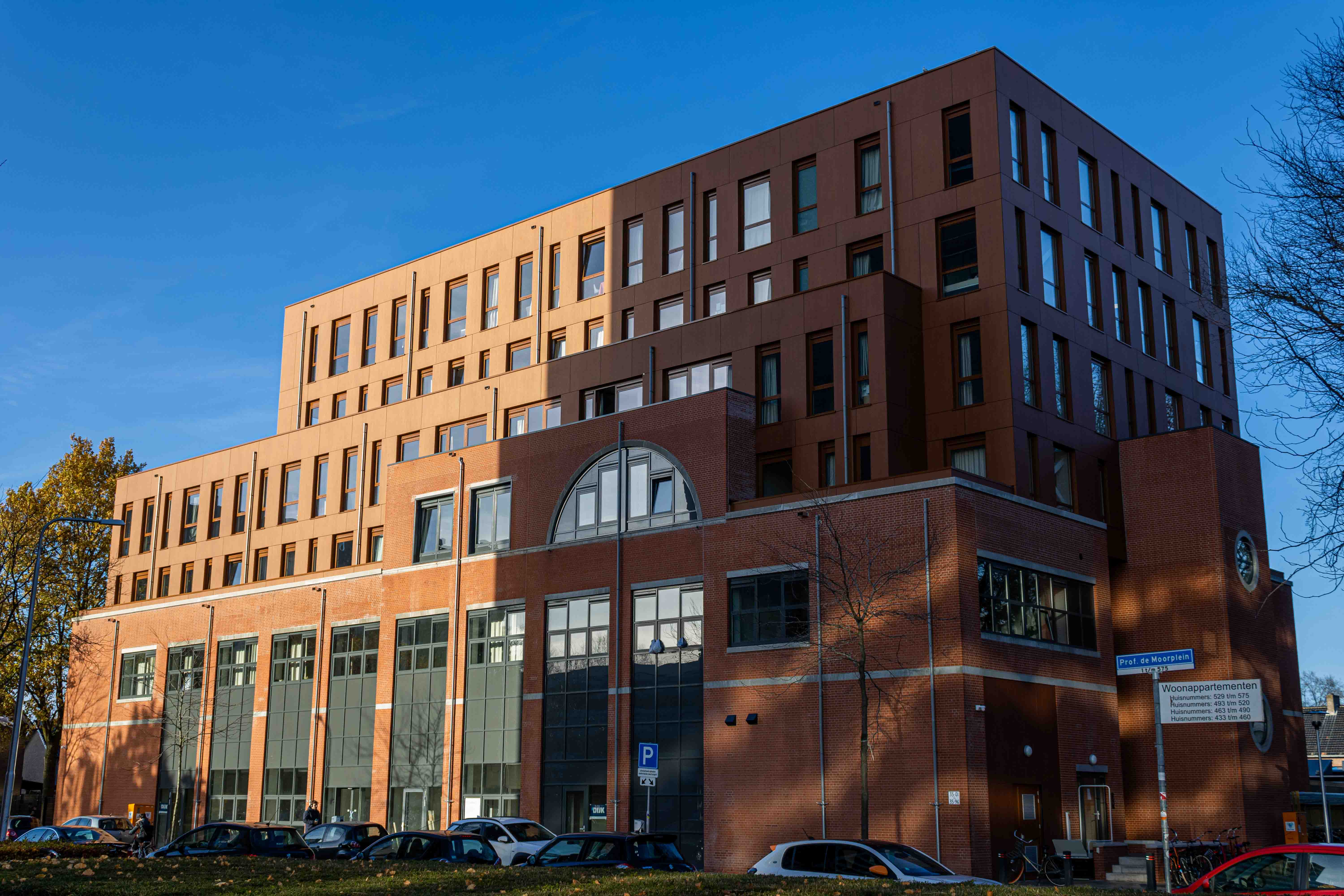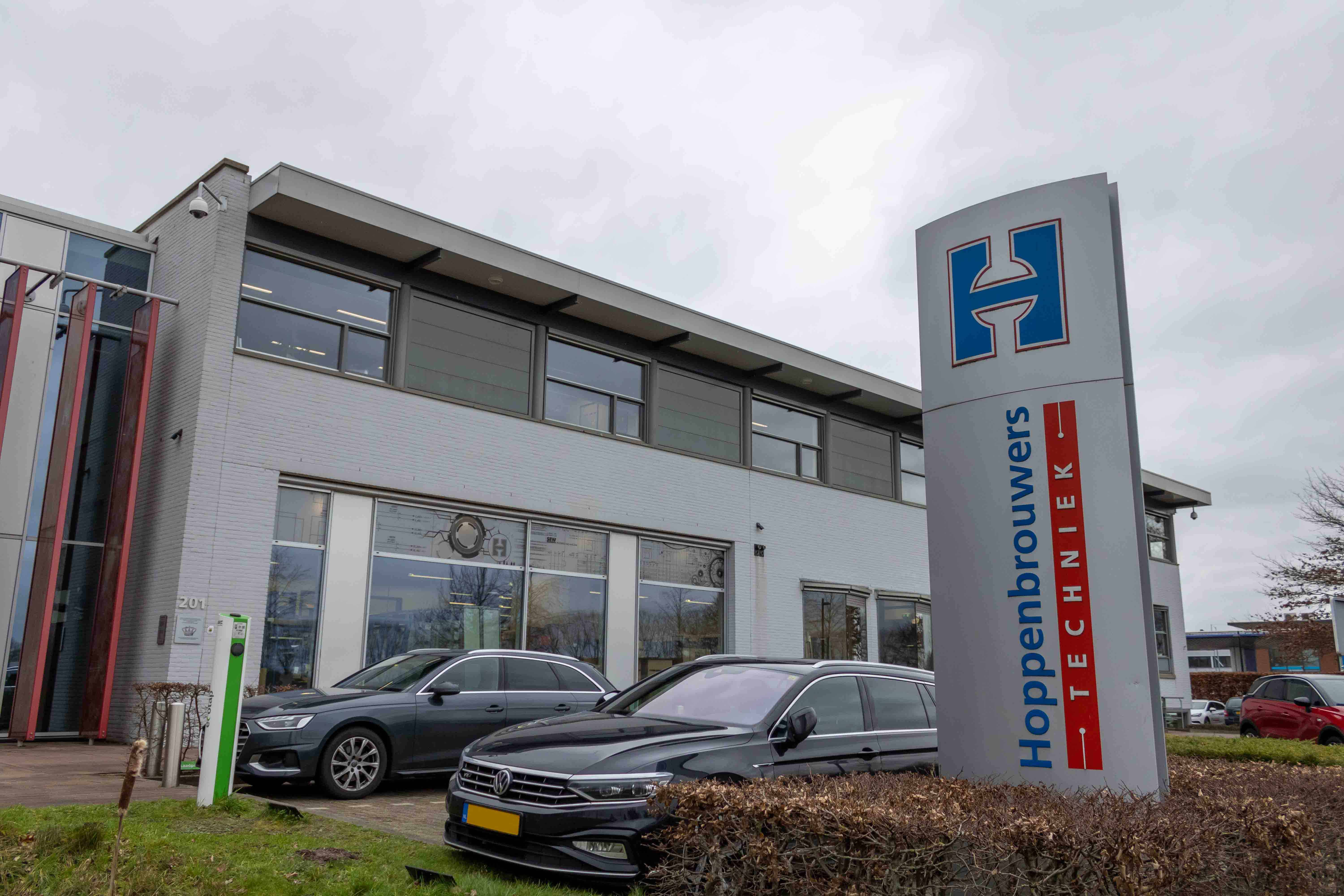
The MindLabs building recently opened in Tilburg’s Spoorzone: a center for artificial intelligence in which various educational institutions and companies will take up residence. Over the past few years, a lot of hard work has already gone into setting up good mutual cooperation. Was that easy? No, certainly not always. The sixth story in a series about the university region of Tilburg.
“I sometimes call Tilburg the best-kept secret in the Netherlands.” Board chairman Fred van der Westelaken of Education Group Tilburg is in an office on the second floor of an elongated, white building that houses ROC Tilburg. The building stands in the middle of the Stappegoor area in the south of the city, flanked by the Koning Willem II College, Campus 013, and the gigantic Fontys site. Yep; Tilburg boasts a veritable educational boulevard.
Van der Westelaken talks enthusiastically about the transformation going on in Tilburg when it comes to education, and the chairman of the board actively contributes to this. “There’s a Rotterdam mentality here: just act normal, that will be crazy enough. I think we should be proud of what is happening here. I originally come from the Breda region. The people over there are proud of themselves. I don’t understand why that’s not the case in Tilburg,” he laughs.
The old textile city of the beginning of the last century is definitely a thing of the past. Tilburg is now committed to a different course within which modern companies and institutions provide a new kind of economy. One of the initiatives to contribute to this is MindLabs: a collaboration between ROC Tilburg, Fontys, Tilburg University, the province of North Brabant, the municipality of Tilburg, and the media group DPG Media. The goal is for the region to make a major step forward in the field of artificial intelligence.

Van der Westelaken is president of the MindLabs association. In addition to being an association, MindLabs will soon be the name of a building in Tilburg’s Spoorzone and the “ecosystem” that has been set up around the association. That ecosystem is a collection of start-ups, scale-ups, and companies that all focus on artificial intelligence. Start-ups can become member for free, but for other partners, there is a price tag. Scale-ups pay five thousand euros per year; medium-sized and large companies pay fifteen thousand euros. The partner list now includes parties such as Interpolis, healthcare organization Thebe, logistics company DB Schenker and Breda University of Applied Sciences.
Within the ecosystem, different institutions and companies will soon be able to cooperate intensively with each other. “MindLabs must be accessible to large companies, but there must also be room for the SME entrepreneur on the corner of the street or for a small institution with a public mission,” Van der Westelaken believes. “We would like all of us to explore, understand and apply the impact of the whole domain of ‘artificial intelligence’.”
The behavioral side of technology
At MindLabs, the emphasis is on human-centered artificial intelligence. When setting up projects, Tilburg does not focus on the technical side of the technology. That task suits Eindhoven better. The focus is mainly on the behavioral side. Van der Westelaken: “The focal point of MindLabs is the impact artificial intelligence has on people’s behavior. In doing so, we want to work across sectors. So: what can the media learn from healthcare and vice versa?”
For example, there is a project investigating how useful augmented reality (AR) technology can be in lessons on machine maintenance, the value of virtual reality in training airline pilots is being investigated, and a project will start that focuses on virtual avatars for healthcare training. All projects involve at least one of MindLabs’ corporate partners.

These are great examples, but the past few years have shown that collaboration within MindLabs does not always come naturally. “It’s almost like eating an elephant. You have to take it one step at a time,” Van der Westelaken admits. “All parties have their own interests. So in the upcoming period, we have to start making sure that the parties involved become dependent on each other. That can be accomplished by, for example, using the same building where they meet. I notice that teachers from different institutions work together very easily. The problems are often with the boards and management. For me, this does not play a role, but of course, I have to account for the interests of ROC Tilburg as well. In any case, we are now entering a phase of less administrative pressure.”
In any case, cooperation between educational institutions requires a different way of thinking. This is the experience of Petra van Dijk, director at MindLabs. “You have to start with people who care a little less about those solidified institutions. Who enjoys exploring how to make this new idea a success? The coalition of the willing, we call it. Within a company, people of all kinds of educational levels also work together. We want to focus on that within MindLabs as well.”
Different worlds
You have to constantly search for common ground, but that is difficult when educational institutions are intrinsically different from each other, this is also the experience of Mirjam Siesling, program manager at Tilburg University and member of the university council. “On paper, of course, you can write down that knowledge institutions must cooperate with each other, but you notice that an academic institution differs substantially from Fontys and ROC Tilburg. The university trains people in an academic way, while HBO and MBO mainly train people to work in practice. That says nothing at all about the quality of those levels of education, but they are very different worlds.”
It’s a big difference, because the university derives its right to exist from doing research. As such, Tilburg University co-founded most of the current projects within MindLabs. “The university’s focus is very much on research projects. This often involves a lot of money because we want to hire new researchers for those projects and have to pay salaries,” Siesling knows. “You quickly talk about tons or millions. Those kinds of research projects play less of a role at Fontys and at ROC Tilburg. That is a substantial difference.”

By the way, it does not mean that the university is not trying to get the cooperation started. Siesling: “There are ongoing discussions between the university and Fontys and ROC Tilburg to see if anything comes out of these studies they can work on. But it really remains a search for cooperation on both sides. During the corona pandemic, students from the ROC helped us set up an online broadcast. They did that super well. You can also help each other facilitatively.”
Loet Visschers, former director of MindLabs, also knows better than anyone that it is not always easy to start a collaboration. “We still have to learn to speak each other’s language,” he says in a video interview. Visschers knows what he is talking about, as he is a strategist at the municipality of Tilburg and a former alderman. “We have to want to work together because if we keep doing what we were doing, we will all face a dark future. We can help each other substantively in projects, but we can also lobby together, for example. But it does require action. Hard action.”
So there is a lot of pressure on Tilburg to make this project a success. “More and more new partners are arriving. The Port of Rotterdam and the Royal Air Force are knocking on our door, asking if they can participate. The question is: can we make it happen? We have to, because once those companies get disappointed, they disappear again. For Tilburg, MindLabs must not fail,” says Visschers.
A big project
In a report by consulting firm ERAC (December 2020), researchers conclude that MindLabs is on a scale whose pointer can point different ways. They formulate several hurdles that MindLabs must overcome to become successful. “It is possible in the case of MindLabs to grow into a unique initiative, but it also has a risk of becoming an organization that does not have the strength in the long run because it has to rely on the indirect involvement of partners,” the report says.
The consultants make a number of recommendations to strengthen MindLabs. For example, they recommend that the association makes arrangements with Fontys’ ICT course, market MindLabs in the region, do one large project that generates a lot of attention, and formulate a clear role for the Municipality of Tilburg. Some of these recommendations have since been put into action: the ICT course is involved in the MindLabs formula. There are other projects upcoming that focus on, for example, virtual humans in healthcare.
In addition, there is still a major risk of short-term ambiguity, the researchers write. They fear “an extensive governance discussion about MindLabs.” This would be “about the relationship of MindLabs with other initiatives.” The question is whether the initiative can gain a foothold in the region, given the collaborations that already exist. The researchers, therefore, suggest MindLabs be corporatized. “It is important to choose a variant that creates an organization beyond an association. An independent entity that can develop its own projects and possibly join projects developed by others.” That recommendation is not being adopted: MindLabs will remain an association.

More and more competitors
That Tilburg needs to move ahead quickly, is evident from a national perspective. More and more cities want to make artificial intelligence their showpiece. The Twente region, with the University of Twente, is putting artificial intelligence in the spotlight in the coming years. The Nijmegen region aims to develop human-centered AI. Amsterdam has ambitions to position itself as a major AI city in Europe. Tilburg’s big brother Eindhoven is also in the running: that city should “become the center for AI engineering. Delft, Leiden, and Utrecht have their own initiatives; There is even more competition at the European level.
Fortunately, MindLabs awaits its own building, with which the association can finally manifest itself clearly. The more than 12,200-square-meter building is rising right next to the internationally award-winning LocHal and will be filled with several state-of-the-art “labs” in which MindLabs can conduct research. “Among other things, we will soon have a robotics lab and a VR lab where our institutions can try out all sorts of things. Cognitive scientists can use electrodes in such a lab to measure your brain activity, your heart rate, or your skin response, for example. That is interesting for all different kinds of parties,” Van Dijk expects.
How will MindLabs prevent all parties from retreating? The answer is simple: seduction. “A company like DPG Media has to be enticed to actively participate. Fontys is really installing state-of-the-art media facilities in the new building. DPG Media will be very enthousiastic about that,” Van der Westelaken expects.
The new building will also have a common interior space that is already referred to internally as ‘the vibrant heart’. “That should be a place where people can just walk in with their questions. That’s how we’re going to facilitate meetings,” Van der Westelaken said. “We also want to start providing an open stage and organize events,” Van Dijk adds.
All uncertainties aside, enthusiasm for MindLabs is certainly there among the chairman and director. “Anyone can just walk in and join the sessions we organize. MindLabs is not a closed environment but a place where cross-fertilising interactions will take place,” says Van Dijk. Van der Westelaken concludes, “I can make you read sixty policy papers, but nothing works exactly as you think it does. You have to give a project like MindLabs space and experience it to the fullest. That leads to the curiosity we need.”
This series also appears in Brabants Dagblad and was created with support from the Tilburg Media Fund.







